Rep Singers Bright Orb of Harmony Concert
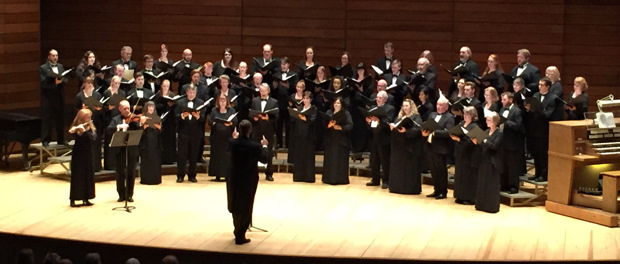 Southern Oregon Repertory Singers, directed by Dr. Paul French, performing Chinese Folksong Magnificent Horses, arranged by Jing Ling Tam, with flautist Jodi French and violinist John McGrosso during Bright Orb of Harmony Concert on Oct. 26, 2014
Southern Oregon Repertory Singers, directed by Dr. Paul French, performing Chinese Folksong Magnificent Horses, arranged by Jing Ling Tam, with flautist Jodi French and violinist John McGrosso during Bright Orb of Harmony Concert on Oct. 26, 2014
Repertory Singers Usher Audience Into Another World
– by Lee Greene
On Sunday, Oct. 26, the audience at the Bright Orb of Harmony Concert at the SOU Recital Hall in Ashland were ushered into the musically rich world of Dr. Paul French, Director of the Southern Oregon Repertory Singers. It is a world that is substantially richer and more expansive musically than that of virtually anyone else you might encounter. His is a world that extends to the far flung corners of the earth, encompasses remarkable music from a wide array of locales, as well as an expansive time frame, and includes a substantial amount of beautiful music that most of us have never encountered. The “Bright Orb of Harmony” is a phrase taken from John Talbot’s “Ode upon the death of Purcell”, celebrating 17th century British composer Henry Purcell, who is regarded as one of the greatest British composers, and an innovative master at the use of harmony in constructing music. In the program notes, Dr. French explains that Purcell “used dissonances (clashing notes) as an intensifier of emotion, a means by which to build tension toward a harmonic resolution. . . . In today’s concert, you will hear that the music of Thomas Tallis, Henry Purcell and Josef Rheinberger all speak a similar language: they all use dissonance to create expressive tensions. French composers, and composers such as Henk Badings, who wrote in a French style, had a different approach. They resisted the creation of harmonic tension via dissonance . . . . [I]n their hands [dissonance] does not create tension, but rather the traditional Gallic goals of color, sensuality, and pleasure. The Latvian composer, Erik Esenvalds employ[s] dissonances as a color and even adds an accompaniment of tuned wine glasses to drive home his point: color is all. Finally, Chinese music takes yet another approach towards the creation of beautiful harmonies. Whereas most western music is based on an eight-note scale . . . Chinese music is based on a five-note scale (pentatonic) which . . . creates a music that is less goal-driven, more static and meditative. All of these approaches to harmony were ‘beautiful’ . . . .”
Thus, Dr. French began his extraordinary tour of beautiful music for the concert audience with four pieces in English by Henry Purcell: (Excerpts from) Come Ye Sons of Art, followed by Hear My Prayer, then Remember, not Lord, Our Offenses, and finally, Jubilate. Come Ye Sons of Art is a birthday ode for alto, chorus and instruments that Purcell composed for Queen Mary II. It opened the concert impressively, with a small orchestra (trumpeter Bruce Dresser, oboist Kirsten Kessler, violinist John McGrosso, violinist Morgan O’Shaughnessey, and cellist Lisa Truelove) and pipe organ (Jodi French, organist) accompanying the Repertory Singers and altos Shelley Cox and Laurie Anne Hunter. The dissonant harmonies were indeed beautiful as advertised. You can get a little bit of a sense of that by watching the video recording snippet, Excerpt from “Come, Ye Sons of Art” presented below. (Note that not only is Dr. French a fount of knowledge about beautiful music, but he is without peer in his ability to lead a choir to produce that music beautifully!)
Excerpt from Henry Purcell’s “Come, Ye Sons of Art” performed by Southern Oregon Repertory Singers, directed by Dr. Paul French, with alto Shelly Cox, alto Laurie Anne Hunter, organist Jodi French, trumpeter Bruce Dresser, oboist Kirsten Kessler, violinist John McGrosso, violinist Morgan O’Shaughnessey, and cellist Lisa Truelove during Bright Orb of Harmony Concert on Oct. 26, 2014 at SOU Music Recital Hall, Ashland, OR
Hear My Prayer was a double-chorus anthem in which Purcell’s “gift for dramatic color prevails throughout. . . .” In Remember, not Lord, Our Offenses, Purcell used a “primarily homophonic setting for 5-voice choir that . . . reinforce his penchant for expressive harmony.” Jubilate is a joyful piece composed for a celebration of St. Cecilia, the patron saint of music, and features soloists, chorus and instruments. It was performed again using the small orchestra, organ and chorus, along with soprano Lindsay Panero, who delivered a brilliant and memorable soprano solo. So Dr. French’s musical tour began with the audience exposed to four quite different pieces sung in English from the same composer, master of harmonies, Henry Purcell, all beautiful and sharing in common dissonant harmonies.
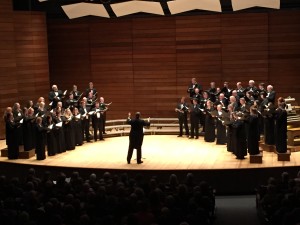
Southern Oregon Repertory Singers, directed by Dr. Paul French, performing Josef Rheinberger’s (Excerpts from) Mass in E-flat Major, “Cantus Missae”, during Bright Orb of Harmony Concert on Oct. 26, 2014
Next, Dr. French introduced the audience to the beautiful music of 19th century German composer, Josef Rheinberger, by having the choir sing (Excerpts from) Mass in E-flat Major, “Cantus Missae”: Kyrie, Gloria and Agnus Dei, in Latin, obviously. The three different movements showed off Rheinberger’s command of a variety of harmonic devices, from the smooth polyphony in the Kyrie, to the “simpler homophonic style often dramatized by high/low polychoral effects” in the Gloria. And this piece again demonstrated the superb quality of this choir’s skill and performance under the direction of Dr. French.
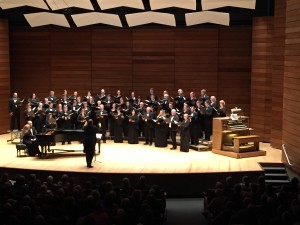
Southern Oregon Repertory Singers, directed by Dr. Paul French, performing Henk Badings’ Troi Chansons Bretonnes, with pianist Jodi French during Bright Orb of Harmony Concert on Oct. 26, 2014
Then, Dr. French shared with the audience the rich colorful harmony of 20th century Dutch composer, Henk Badings, who composed a musical setting in the French style for three poems by early 20th century French poet Theodore Botrel: Troi Chansons Bretonnes: La nuit en mer, La complainte des âmes and Soir d’été, sung in French obviously. The three songs differed in their harmonics, mood, and tempo, again presenting a considerable variety of harmonic color, and again giving this incomparable choir a chance to show their range and skill. (Dr. French was heard to say that this composition by Badings was one of his favorites, but that it wasn’t easy to perform, and he feared some of the choir might be unhappy with him at how hard they had to work to master the piece. Perhaps, but it was definitely worth the effort. It was indeed performed beautifully and upon its conclusion, the audience was effusive in its response.)
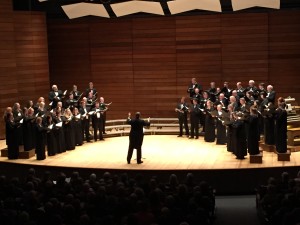
Southern Oregon Repertory Singers, directed by Dr. Paul French, performing Thomas Tallis’ Lamentations of Jeremiah, during Bright Orb of Harmony Concert on Oct. 26, 2014.
After intermission, Dr. French took the audience back in time, to the harmonic music of 16th Century English composer, Thomas Tallis, as a smaller five-part (Alto, Tenor 1, Tenor 2, Baritone and Bass) portion of the Repertory Singers performed his Lamentations of Jeremiah. The piece is a setting, in Latin, of the venerable Catholic text of the Lamentations by the prophet Jeremiah over the destruction of Jerusalem by Babylonians. The piece was the oldest composition performed in this concert, and demonstrates that even as far back as the 16th century, dissonance was being used to create harmonic tension.
For the next piece, Dr. French jumped forward to the late 20th century, as the Repertory Singers performed a contemporary work by 37 year old Latvian composer, Erik Esenvalds: Stars. Stars is a setting of a short poem by Sara Teasdale which is remarkable for how it produces harmonies: First, by the use of sweet tone clusters, and second, through the use of tuned wine glasses played by the choir members to produce the clusters. The performance of this piece was both aurally and visually quite unique. For a brief look at this unique performance, watch the video recording “Last minute excerpt of Eriks Esenvalds’ Stars” presented below.
Last minute excerpt of Eriks Esenvalds’ “Stars” performed by Southern Oregon Repertory Singers, under the direction of Dr. Paul French, during the Bright Orb of Harmony Concert on Oct. 26, 2014 at SOU Music Recital Hall, Ashland, OR
To conclude the concert, Dr. French presented the audience with four pieces of very different Chinese pentatonic music: Chinese Folk Songs. This section of the program began with the performance of two traditional Chinese folksongs sung in Mandarin: Fenyang Song, a high-spirited folksong and The Flowing Stream, a slow tempo love song, which 61 year old contemporary arranger/composer Chen Yi learned during travels in the provinces of China and later arranged for Chanticleer.
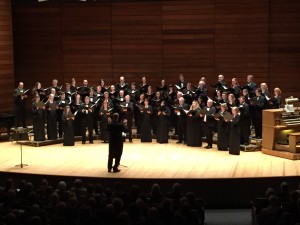
Southern Oregon Repertory Singers, directed by Dr. Paul French, performing Chinese Folksong Fengyang Song, arranged by Chen Yi, during Bright Orb of Harmony Concert on Oct. 26, 2014.
These pieces were both lovely sounding and very different from what one would ordinarily expect to hear at a choral concert in America. They were in a way hypnotic, soothing; to use Dr. French’s term, meditative. They were followed by an original composition by Chen Yi: Spring Dreams. Spring Dreams was unusual and remarkable – it used a double choir and mixed traditional Chinese pentatonic choral parts with Modernist styles. The piece includes phrases half-spoken and half-sung, imitation bird calls and an extensive palate of vocal colors. The final piece on the program, Magnificent Horses, was a fantasy on a Mongolian folk tune arranged by contemporary Chinese American composer/choral conductor Jing Ling Tam (see lead photo at top of page). The work uses a pentatonic setting to produce a non-stop imitative gallop of horses. The performance was spirited and energetic and featured an interesting and well done solo by baritone Michael Wing. Magnificent indeed, the piece was enthusiastically received by the audience and hence a fitting conclusion to the concert.
In a little over two hours, the audience at this concert had been exposed to choral music in English, French, Latin, and Mandarin, choral music spanning the time frame from the 16th century to music from living contemporary 21st century composers, music which featured harmonic tension and music which featured harmonic color, music applying a normal western eight note scale and music applying a Chinese five note scale, music accompanied by orchestral instruments and music accompanied by water-tuned glasses, choral music enunciated sublimely, choral music half-sung and half-spoken, choral music incorporating imitative bird calls, and choral music mimicking galloping horses. All superbly performed – tight, in tempo, in tune, in perfect harmonies. A concert unlike any other concert in memory. Welcome to the world of Dr. Paul French.
The Southern Oregon Repertory Singers will next perform in the Holly and the Ivy concert on Saturday Dec. 20 at 7:30 pm and Sunday, Dec. 21 at 3:00 pm at SOU Music Recital Hall, Ashland. It is described as a Carol Concert celebrating music from around the world. The Repertory Singers will be accompanied by winds, harp, piano, organ, and a consort of viols. Sounds like another golden opportunity to explore and enjoy the musically rich world of Dr. Paul French. I wouldn’t miss it, and neither should you. For tickets, order online at http://repsingers.org/tickets or order by phone at 541-552-0900 (leave a short message with your number and best time to return your call).
This review was originally published by the Jacksonville Review on October 29, 2014 at http://jacksonvillereview.com/repertory-singers-usher-audience-another-world/


